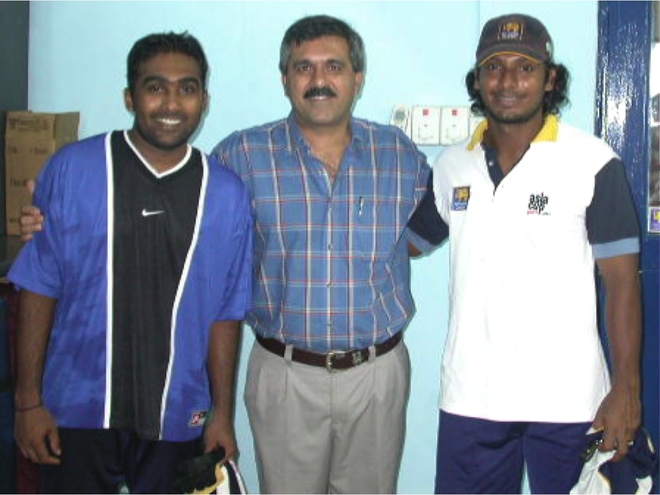Mandeep Dhillon
In 2003, when I was working as a sports medicine doctor in Sri Lanka, I first heard about Kumar Sangakkara from his good friend Mahela Jayewardene, the day he and my wife became members of the Colombo Golf Club. Kumar, a relatively new induction in the Sri Lanka team, was known as a gentleman cricketer and an erudite personality.
I met him for the first time at Colombo airport, when we all were flying to Chennai to be in Muttiah Muralitharan’s baraat, and I was introduced to him and his pretty wife Yehali. The wedding bonded me significantly with the team. My association with them grew outside the cricket field, and I gradually got to know about the man who would change from a good wicketkeeper to one of Sri Lanka’s best ever batsmen. Even then his good manners and charming personality, combined with an Oxbridge accent, made him stand out in any gathering.
I returned to India in 2005 and stayed in touch with the Sri Lankan cricketers. When the whole team came for a dinner I hosted in October 2005, Murali and Kumar were at the forefront, and for certain reasons nicknamed me “Dr D”, a name by which most Sri Lankans still call me. But that is another story…
The IPL brought him back to Chandigarh. In their first year in the IPL, I invited him and Mahela to the Golf Club for dinner. Their wives were with them, and when I went to pick them up, the kind side of the man was revealed. He took me aside in the lobby of the Taj and said: “Dr D, do you mind if I invite Dinesh Karthik? I just saw him sitting alone, as the Delhi team players all have their individual commitments. Let’s not leave him alone, shall we?”
And off we went to the club where we had a rip-roaring time. I still remember the Sri Lankan ladies going crazy over tandoori paneer tikka, as the concept of paneer does not exist in the Emerald Island. Kumar, Mahela, Karthik and I just enjoyed ourselves. It was so strange to see the two wicketkeepers from different countries, and different club teams, bonding over dinner.
In 2009 I called up Kumar from India to congratulate him the day he was elevated as captain. “Dr D,” he shouted, “are you in Colombo?”
When I said no, his disappointment was genuine, but he made me feel so good about the fact that I had called him up. I could not but admire the gentlemanly aspects of his character. We were together again in 2010, when Muralitharan invited me as his guest for his farewell Test in Galle. Kumar was the captain of the team. I was sitting through the humiliating last day of the match, as India was being thrashed badly, but Murali was stuck on 799 Test wickets and India’s last pair was batting. Malinga stormed through the Indian side in the second innings, and we all thought that Murali would be denied his 800th wicket. But the gentleman that Kumar is, he persisted with Murali’s bowling from one end, even with the new ball, till he got his 800th wicket, when he dismissed Ojha.
The victory lap they did, with Kumar lifting Murali onto his shoulders, was again special; his focus was on Murali’s achievement, not the fact that he was captain (and had made a fine century to boot) of a team that had thrashed the Indians in a historic Test.
One of his finest moments off the field was when he delivered the 2011 MCC Spirit of Cricket Cowdrey Lecture. I read the transcripts and the worldwide attention this outspoken lecture, by an amazing speaker, was given. Not only was he the youngest person, but also the first active international player to deliver this lecture. These are all qualities that I know will mark him as an excellent ambassador of the game after his retirement.
On the professional side, I have to admit that I never treated Kumar Sangakkara for an orthopaedic ailment. All the other players, from Murali to Vaas, Jayasuriya to Malinga, had some issue or the other requiring my professional attention. Not Kumar, though, as his fitness and meticulous attention to training kept him relatively injury-free. And this despite the fact that he kept wickets and was the premier batsman of the team for a large duration of his playing years.
May the retirement years be as good to him as he has been to the game; I feel that his social interaction skills, his erudition and charm, will serve him well and he can become an excellent ambassador for the sport. God bless you, my friend.
The writer is Professor & Head Orthopaedics, and Head Physical Medicine Deptt, PGI
Unlock Exclusive Insights with The Tribune Premium
Take your experience further with Premium access.
Thought-provoking Opinions, Expert Analysis, In-depth Insights and other Member Only Benefits
Already a Member? Sign In Now










